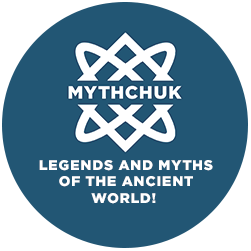Hades — Greek God of the Underworld, Justice and Finality
- Main
- >
- Greek Mythology
- >
- Greek Pantheons of the Gods
- >
- Hades
He was feared by all — even without acting. But why did Hades himself never commit evil?
Hades is the eldest son of the Titan Cronus and the goddess Rhea, brother to Zeus and Poseidon. After the defeat of the Titans, he became ruler of the underworld of souls. Unlike a god of death, he did not kill — he welcomed the departed. His reputation rests on restraint, the rule of law, and unshakeable justice.
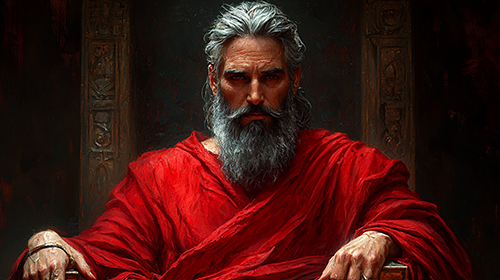 Hades
HadesBirth, Swallowing, and Liberation
As Hesiod recounts in the Theogony, the Titan Cronus swallowed each of his children at birth to prevent a prophecy of being overthrown. Hades, one of the first sons, was swallowed as an infant — only to be restored later when Zeus forced Cronus to disgorge his offspring. Hades emerged already grown and ready for war.
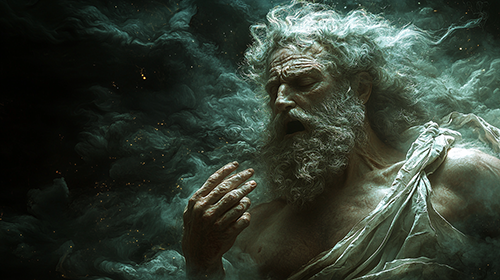 Birth, Swallowing, and Liberation
Birth, Swallowing, and LiberationTitanomachy and the Division of the World
Alongside Zeus and Poseidon, Hades took part in the Titanomachy — the decade-long war between the Olympian gods and the Titans. With victory secured, the gods drew lots to divide the realms:
- Zeus received the sky,
- Poseidon the sea,
- Hades claimed the Underworld.
This division wasn’t a punishment. Hades did not lose dignity — he became ruler of the realm that no mortal soul could avoid.
 Titanomachy
TitanomachyLord of Shadows
Hades’ realm — called Hades, like the god himself — was not a Christian-style hell, but rather a realm for the dead:
- The Asphodel Fields for ordinary souls,
- Elysium for the righteous,
- Tartarus for criminals and Titans.
Judgment was administered by Minos, Aeacus, and Rhadamanthus, though Hades’ power remained supreme. He forgives no one, seeks no revenge — he simply enforces the immutable law: every soul must enter his domain.
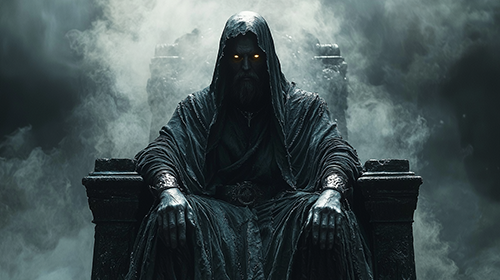 Lord of Shadows
Lord of ShadowsPersephone — Queen of the Underworld
The most famous myth involving Hades is his abduction of Persephone, daughter of Demeter. According to Homer, Hesiod, and Hyginus, Hades fell in love with Persephone and carried her off while she was picking flowers.
This sparked Demeter’s grief, causing the earth to cease producing crops. Zeus brokered a compromise: because Persephone had eaten pomegranate seeds in the Underworld, she would spend part of each year with Hades and the rest with her mother — thus explaining the seasons: spring and summer on earth, autumn and winter in the Underworld.
Hades never acts violently in the original texts — he simply fulfills his role, shadowed but composed.
 Persephone
PersephoneHades Among the Gods
In Homer’s Odyssey, Hades is a name rarely spoken — avoided out of fear of death. Yet he is not demonic, evil, or deceptive. He is the impartial judge and ruler of a necessary realm. He does not intervene in the Trojan War or meddle with other gods or humans. His concern lies beyond life — and in that lies his profound consistency.
 Hades Among the Gods
Hades Among the GodsAttributes and Unique Traits
Hades is associated with several key symbols:
- The Helmet of Invisibility (also called the Cap of Hades), crafted by Cyclopes and famously lent to Perseus;
- A scepter and keys symbolizing his dominion over the Underworld;
- A throne of black obsidian, spoken of in temple descriptions;
- Cerberus, the three-headed hound guarding the Underworld’s gates.
He is never depicted with thunderbolts or tridents — he performs no flashy miracles, but governs the silence.
 Cerberus
CerberusCult and Worship
In ancient Greece, large temples to Hades were rare, but he was still worshipped under the name Pluto (meaning “the wealthy one”) — since all souls eventually became his subjects.
Pausanias mentions a temple in Elis that was opened only once a year. Offerings were quiet, solemn, and head‑bowed. His cult centered not on fear of evil, but on acceptance of death’s inevitability.
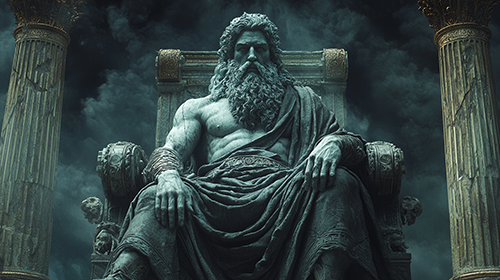 Cult and Worship
Cult and WorshipHades vs. Death
Crucially, Hades is not the god of death — that role belonged to Thanatos (the personification of death) and the Keres (spirits of violent death). Hades is the ruler after death has occurred.
He does not decide who dies; he simply receives souls. His authority lies in quiet acceptance, not the act of killing.
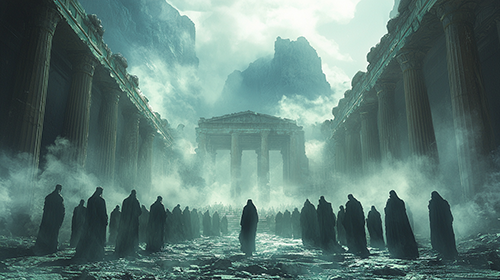 Hades vs. Death
Hades vs. DeathSymbolism of Hades
Hades is one of the most stable and disciplined gods of Olympus. He is never shown angry or in love — he presides over endings and transitions. His function is to preserve order in the most daunting realm of all.
His symbols — the key, shadow, silence, justice, and Persephone — emphasize that his unchanging nature is precisely what gives him power.
Today, Hades remains a fixture in literature, psychology, and philosophy — a reminder that all things come to an end, and that ending is not evil, but finality.
